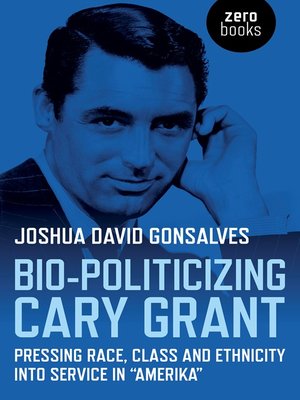Bio-Politicizing Cary Grant
ebook ∣ Pressing Race, Class and Ethnicity into Service in "Amerika"
By Joshua David Gonsalves

Sign up to save your library
With an OverDrive account, you can save your favorite libraries for at-a-glance information about availability. Find out more about OverDrive accounts.
Find this title in Libby, the library reading app by OverDrive.



Search for a digital library with this title
Title found at these libraries:
| Loading... |
Who will Cary Grant have been when the future runs out? In the atrocity-rich wake of Hiroshima, Cold War America is enriched beyond belief. Hollywood radiates, in turn, images of a consumer utopia criss-crossed by segregation, social mobility, racial passing, anxieties about ethnicity and "white panic". Cary Grant's class-less classiness seems to denote this (sub)urban leisure class without an effort, yet he signifies more than this: ambivalent, bi-sex'd, inter-sected by the biopolitics of racialization, the policing of sexual agency and stereotypical ethnic identifications (including the invisible Anglo instanced by the high-angle shot). If biopolitics signifies the individuated control of populations, Bio-Politicizing Cary Grant: Pressing Race, Class and Ethnicity into Service in Amerika locates this anxious racialization of service persons, interracial sexuality and social mobility (passing) in an Americanized simulacrum of the Mediterranean world in To Catch a Thief (1955) and in a New York/Northeast-centered USA in North by Northwest (1959). Bio-Politicizing Cary Grant queries the criticism of Alfred J. Hitchcock's films so as to historically situate one of the first free agents in Hollywood. Yet this semblance of freedom pays a price in meat, murder, massification and the organized homicide of Cold War geopolitics. The book explicates, in sum, the ethnic, racial and sexual ambiguity of Cary Grant's star persona as both an inculcation of (and resistance to) biopolitical imperatives in fifties-era "America".






